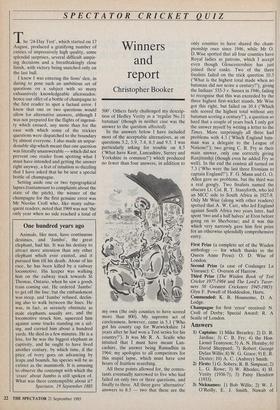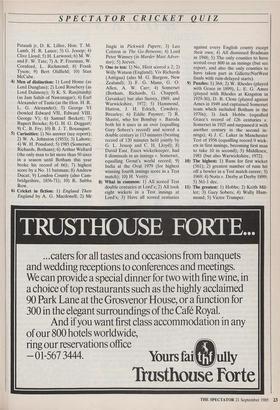SPECTATOR CRICKET QUIZ
The '24-Day Test', which started on 17 August, produced a gratifying number of entries of impressively high quality, some splendid surprises, several difficult umpir- ing decisions and a breathtakingly close finish, with victory being snatched only on the last ball.
I knew I was entering the lions' den, in daring to pose such an ambitious set of questions on a subject with so many exhaustively knowledgeable aficionados: hence our offer of a bottle of champagne to the first reader to spot a factual error. I knew that one or two questions would allow for alternative answers, although I was not prepared for the flights of ingenui- ty which ensued, any more than for the ease with which some of the trickier questions were dispatched to the boundary by almost everyone. I also made an unpar- donable slip which meant that one question was literally unanswerable—which did not prevent one reader from spotting what I must have intended and getting the answer right anyway, a feat of intuition so dazzling that I have asked that he be sent a special bottle of champagne.
Setting aside one or two typographical lapses (tantamount to complaints about the state of the pitch), the winner of the champagne for the first genuine error was Mr Nicolas Croll who, Iike many subse- quent readers, noted that 1969 was not 'the only year when no side reached a total of
Winners and report
Christopher Booker
500'. Others fairly challenged my descrip- tion of Hedley Verity as a 'regular No.11 batsman' (though in neither case was the answer to the question affected).
In the answers below I have included most of the acceptable alternatives, as on questions 3.2, 5.9, 7.4, 8.5 and 9.5. I was particularly asking for trouble on 8.5 (What have Kent, Lancashire, Surrey and Yorkshire in common?') which produced no fewer than four answers, in addition to my own (the only counties to have scored more than 800). My supreme act of carelessness, however, came in 5.1 (Who got his county cap for Warwickshire 14 years after he had won a Test series for his country?'). It was Mr R. A. Scaife who intuited that I must have meant Lan- cashire, the answer being Ramadhin in 1964; my apologies to all competitors for this stupid lapse, which must have cost hours of fruitless searching.
All these points allowed for, the contes- tants eventually narrowed to five who had failed on only two or three questions, and finally to three. All three gave 'alternative' answers to 8.5 — two that these are the only counties to have shared the cham- pionship once since 1946, while Mr 0. D.Wise spotted that all four counties have Royal ladies as patrons, which I accept even though Gloucestershire has just joined their ranks. Two of the three finalists failed on the trick question 10.5 (What is the highest total made when no batsman did not score a century?'), giving the Indians' 533-3 v. Sussex in 1946, failing to recognise that this was exceeded by the three highest first-wicket stands. Mr Wise got this right, but failed on 10.4 (Which side scored the highest total without any batsman scoring a century?'), a question so hard that a couple of years back I only got the answer myself by writing a letter to the Times. More surprisingly all three had problems with 4.3 (Which England bats- man was a delegate to the League of Nations?'); two giving C. B. Fry as their main answer, only one correctly giving Ranjitsinhji (though even he added Fry as well). In the end the contest all turned on 7.3 (Who were the last three Etonians to captain England?'). F. G. Mann and G. 0. Allen gave no problems, but the third was a real googly. Two finalists named the obscure Lt. Col. R. T. Stanyforth, who led an MCC side to South Africa in 1927-8. Only Mr Wise (along with other readers) spotted that A. W. Carr, who led England against South Africa two years later, had spent 'two and a half halves' at Eton before going on to Sherborne; and it was this which very narrowly gave him first prize for an otherwise splendidly comprehensive entry.
First Prize (a complete set of the Wisden anthology — for which thanks to the Queen Anne Press): 0. D. Wise of London.
Second Prize (a case of Coulanges La Vineuse): C. Overson of Harrow.
Third Prize (The Wisden Book of Test Cricket 1977-1984 and The Lord's Taver- ners 50 Greatest Cricketers 1945-1983): Glyn F. Powell of Hoddesdon, Herts. Commended: K. R. Hounsome, D. A. Lodge.
Champagne for first 'error' received: N. Croll of Derby; Special Award: R. A Scaife of London.
Answers
1) Captains: 1) Mike Brearley; 2) D. R. Jardine; 3) C. B. Fry; 4) the Hon. Lionel Tennyson; 5) A. N. Hornby; 6) David Sheppard; 7) Robert George Dylan Willis; 8) W. G. Grace; 9) E. R. Dexter; 10) A. C. (Aubrey) Smith.
2) Firsts: 1) G. Sobers; R. B. Simpson; 2) L. G. Rowe; 3) W. Rhodes; 4) H. Verity (1936-7); 5) Patsy Hendren (1933).
3) Nicknames: 1) Bob Willis; 2) W. J. O'Reilly, E. J. Smith, Nawab of
SPECTATOR CRICKET QUIZ
Pataudi jr, D. K. Lillee, Hon. T. M. Lamb, H. R. Lance; 3) G. Jessop; 4) Clive Lloyd; 5) H. Larwood; 6) M. W. and F. W. Tate; 7) A. P. Freeman, W. Cornford, L. Richmond; 8) Frank Tyson; 9) Bert Oldfield; 10) Stan McCabe.
4) Men of distinction: 1) Lord Home (as Lord Dunglass); 2) Lord Rosebery (as Lord Dalmeny); 3) K. S. Ranjitsinhji (as Jam Sahib of Nawanagar); 4) Earl Alexander of Tunis (as the Hon. H. R.
L. G. Alexander); 5) George VI (bowled Edward VII, Edward VIII, George V); 6) Samuel Beckett; 7) Rupert Brooke; 8) G. H. G. Doggart; 9) C. B. Fry; 10) B. J. T. Bosanquet.
5) Curiosities: 1) No answer (see report); 2) W. A. Johnston (1953); 3) Lahore; 4) W. H. Ponsford; 5) 1985 (Somerset, Richards, Botham); 6) Arthur Wellard (the only man to hit more than 50 sixes in a season until Botham this year broke his record of 66); 7) highest score by a No. 11 batsman; 8) Andrew Ducat; 9) London County (also Cam- bridgeshire, 1856-71); 10) R. Subba Row.
6) Cricket in fiction: 1) England Their England by A. G. Macdonell; 2) Mr Jingle in Pickwick Papers; 3) Leo Colston in The Go-Between; 4) Lord Peter Wimsey (in Murder Must Adver- tise); 5) Jeeves.
7) One to ten: 1) No, Hirst scored a 2; 2) Willy Watson (England), Viv Richards (Antigua) (also M. G. Burgess, New Zealand); 3) F. G. Mann, G. 0. Allen, A. W. Carr; 4) Somerset (Botham, Richards, G. Chappell, Gavaskar) but also Surrey, 1969, and Warwickshire, 1972; 5) Hammond, Hutton, J. H. Edrich, Cowdrey, Brearley; 6) Eddie Paynter; 7) R. Shastri, who for Bombay v. Baroda both hit 6 sixes in an over (equalling Gary Sobers's record) and scored a double century in 113 minutes (beating record of 120 minutes held jointly by G. L. Jessop and C. H. Lloyd); 8) David East, Essex wicketkeeper, had 8 dismissals in an innings v. Somerset, equalling Grout's world record; 9) India at the Oval 1979 (for highest winning fourth innings score in a Test match); 10) H. Verity.
8) What in common: 1) All scored Test double centuries at Lord's; 2) All took eight wickets in a Test innings at Lord's; 3) Have all scored centuries against every English county except their own; 4) All dismissed Bradman in 1948; 5) The only counties to have scored over 800 in an innings (but see report, and also the only counties to have taken part in Gillette/NatWest finals with rain-delayed starts). 9) Puzzles: 1) 364; 2) W. Rhodes (played with Grace in 1899), L. E. G. Ames (played with Rhodes at Kingston in 1929-30), D. B. Close (played against Ames in 1949 and captained Somerset team which included Botham in the 1970s); 3) Jack Hobbs (equalled Grace's record of 126 centuries v.
Somerset in 1925 and surpassed it with another century in the second in- nings); 4) J. C. Laker in Manchester Test of 1956 (equalling record 9 wick- ets in first innings, becoming first man to take 10 in second); 5) Middlesex, 1981 (but also Warwickshire, 1972).
10) The highest: 1) Runs for first wicket (561); 2) greatest number of runs hit off a bowler in a Test match career; 3) 1969; 4) Notts v. Derby at Derby 1899; 5) 561-1 dec.
11) The greatest: 1) Hobbs; 2) Keith Mil- ler; 3) Gary Sobers; 4) Wally Ham- mond; 5) Victor Trumper.















































 Previous page
Previous page